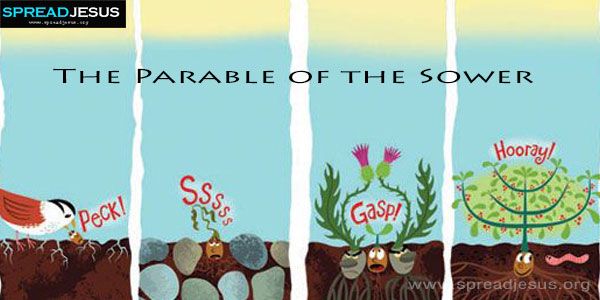“A year of colour and sex” is how the author puts it. He gushes. Over what? Over the abundant flowering of trees. In the jungles. He begins:
It has been a year of colour and sex for the lowland rainforests of Malaysia and Indonesia. This [2019] is a “mast year,” when dozens of tree species produce bumper crops of flowers, fruits, and seeds simultaneously. Since April, the canopy has been a splendid mosaic of yellow, orange, and red set against green. It has been 5 years since the spectacle was last seen. (link)
I’ve been thinking about flowers, fruits and seeds for two reasons. First, on Sunday a friend mentioned he was going to spend a few days watching events around a tree which is “flowering in the jungle.” Second, I’ve been reading Jesus’ parable of the soils.
The parable is also known as the parable of the Sower. It’s in the Gospel according to Matthew, in chapter 13, verses 1-23. It’s the Gospel portion in the lectionary readings for Sunday. Luke also records it in his Gospel, in chapter 8, verses 4-15.
It’s a parable, a simple story with deep, mystical meaning, often pushing the hearer into a corner, confronting him or her with a decision. Jesus is famous for disturbing ordinary lives with troubling stories. Troubling partly because they challenge our ideas about God.
The troublesome nature of Jesus parables is flushed out by Jesus himself when he explains it to his disciples. How so? Because he says God blocked the ability of non-disciples (“them”) to understand his words:
Matthew 13:10 Then the disciples came and said to [Jesus], “Why do you speak to them in parables?” 11 And he answered them, “To you it has been given to know the secrets of the kingdom of heaven, but to them it has not been given.
Jesus even appealed to the words of prophet Isaiah (Isaiah 6:9-10) to explain why God blocked them:
Matthew 13:15b … lest they should see with their eyes and hear with their ears and understand with their heart.
The meaning of those words is clear: God’s decision is the final cause of their lack of understanding and lack of right response to his words.
But Jesus introduces those words with an account of their own stubbornness – and therefore their own responsibility – for their state:
Matthew 13:15a For this people’s heart has grown dull, and with their ears they can barely hear, and their eyes they have closed, …
What was the parable?
A farmer goes out to scatter seed, before ploughing it into the ground. The seed falls in four places: on the path, on rocks, among weeds, and on good soil. Only what falls on good soil produces fruit. (The first is devoured by birds. The second is scorched by the sun. The third is choked by weeds.)
What lesson does Jesus teach using this parable? Who’s the Sower? What’s the seed? Why does it matter?
The Sower is the one who sows “the word of the kingdom” (verse 19).
What’s the word of the kingdom? It’s the announcement that the era looked for by “many prophets and righteous people” (verse 17) has come. The lamb of God who takes away the sins of the world has come. The end of the reign of Satan has begun. The reign of Jesus has begun.
What reign? In 3:17, Matthew wrote of Jesus baptism by John, when a voice from heaven said “this is my beloved son, with whom I am well pleased.” Matthew followed that account with the temptation of Jesus by the devil, then reported Jesus response to the arrest of John Baptist:
“Repent, for the kingdom of heaven is at hand (Matthew 4:17b).
The seed is the announcement that King Jesus is on the throne. I like how Dutch theologian and statesman Abraham Kuyper (1837-1920) put it:
There is not a square inch in the whole domain of our human existence over which Christ, who is Sovereign over all, does not cry, ‘Mine!’
For those whose ears are open, that’s the lesson of the parable.
We’re to live as those ruled by Jesus. We’re to live under his reign. We’re to love God, ourselves, and our neighbours as ourselves (Matthew 22:37; Mark 12:30; Luke 10:27). We’re to advocate and labour for truth, justice, and peace, as ambassadors of Christ (2 Corinthians 5:20).[1]
That’s the bumper crop of flowers, fruits and seeds of the kingdom. That’s the “colour and sex” of kingdom people.
Why don’t people gush and write about it? Is it because it’s ordinary, happens every day and there’s no mast year? Or is it because people have chosen to be deaf and therefore, unproductive?
[1] Some will bear thirty-fold, some sixty-fold, some hundred-fold (verse 23). We’re put in different places, given different opportunities, to produce different fruits. I must also point out that this is a very politically charged occasion – Jesus drew an immense crowd (verse 2) in occupied territory, under the noses of the occupiers (Romans) and their allies and spies: imagine addressing a crowd in Port Dicksion during the Japanese occupation, about “the Kingdom” (verse 19) – which means the people, policies and politics associated with government.
To learn more about Rama, click here.



Pingback: Don’t pull out the weeds? – Bangsar Lutheran Church
Pingback: How do they know she’s a Christian? – Bangsar Lutheran Church